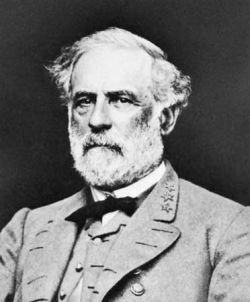 Colonel William S. Christian, a physician and Baptist layman now commanding the 55th Virginia Infantry Regiment of of Confederate Gen. Robert E. Lee‘s Army of Northern Virginia that is invading Northern soil, today writes to his wife of their advance northward.
Colonel William S. Christian, a physician and Baptist layman now commanding the 55th Virginia Infantry Regiment of of Confederate Gen. Robert E. Lee‘s Army of Northern Virginia that is invading Northern soil, today writes to his wife of their advance northward.
Camp near Greenwood, Pa., June 28, 1863
My own darling Wife : I have written two letters to you since I left the trenches at Fredericksburgh. I received a letter from you, dated the fourteenth instant. You may be sure I devoured its contents with great eagerness, but oh ! how I was pained to hear that you were so unwell ! It makes me miserable to think of you as suffering bodily afflictions, with all the great troubles you now have to contend with, and I not there to help you.
You can see by the date of this, that we are now in Pennsylvania. We crossed the line day before yesterday, and are resting to-day near a little one-horse town on the road to Gettysburgh, which we will reach to-morrow. We are paying back these people for some of the damage they have done us, though we are not doing them half as bad as they done us. We are getting up all the horses, etc., and feeding our army with their beef and flour, etc., but there are strict orders about the interruption of any private property by individual soldiers.
Though with these orders, fowls and pigs and eatables don’t stand much chance. I felt when I first came here, that I would like to revenge myself upon these people for the desolation they have brought upon our own beautiful home ; that home where we could have lived so happy, and that we loved so much, from which their vandalism has driven you and my helpless little ones. But though I had such severe wrongs and grievances to redress, and such great cause for revenge, yet when I got among these people I could not find it in my heart to molest them. They looked so dreadfully scared and talked humble, that I have invariably endeavored to protect their property, and have prevented soldiers from taking chickens, even in the main road; yet there is a good deal of plundering going on, confined principally to the taking of provisions. No houses were searched and robbed, like our houses were done, by the Yankees. Pigs, chickens, geese, etc., are finding their way into our camp; it can’t be prevented, and I can’t think it ought to be. We must show them something of war. I have sent out to-day to get a good horse ; I have no scruples about that, as they have taken mine. We took a lot of negroes yesterday. I was offered my choice, but as I could not get them back home I would not take them. In fact, my humanity revolted at taking the poor devils away from their homes.
They were so scared that I turned them all loose. I dined yesterday with two old maids. They treated me very well, and seemed greatly in favor of peace. I have had a great deal of fun since I have been here. The country that we have passed through is beautiful, and every thing in the greatest abundance. You never saw such a land of plenty. We could live here mighty well for the next twelve months, but I suppose old Hooker will try to put a stop to us pretty soon. Of course we will have to fight here, and when it comes it will be the biggest on record. Our men feel that there is to be no back-out. A defeat here would be ruinous. This army has never done such fighting as it will do now, and if we can whip the armies that are now gathering to oppose us, we will have every thing in our own hands. We must conquer a peace. If we can come out of this country triumphant and victorious, having established a peace, we will bring back to our own land the greatest joy that ever crowned a people. We will show the Yankees this time how we can fight.
Be of good cheer, and write often to your fondly attached husband,
William S. Christian
The letter is never delivered, but instead is discovered on the battlefield following the Battle of Gettysburg, a battle of such epic proportions that Christian likely could not have anticipated. Christian survives the war.
Source: Frank Moore, ed., The Rebellion Record: A Diary of American Events, 12 Vols., New York: Putnam, 1861-63, Van Nostrand, 1864-68, 7:325 (link)


